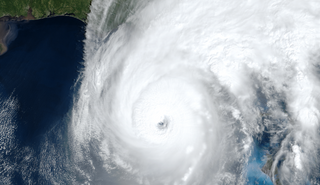'More intense hurricanes form rapidly due to climate change'
14 November 2022

Climate change is increasing the probability that tropical cyclones rapidly grow into intense, damaging hurricanes in a few hours, a breakthrough study has found.
Links between human-caused global warming and the strength of storms have previously been suggested, but this new study shows how a warmer world is making storms morph rapidly into powerful hurricanes or typhoons in a single day, posing a huge challenge to weather forecasters.
The new study, co-authored by University of Reading scientists, concludes that rising global temperatures are making these rapid transformations of storms more. These stronger storms disproportionately risk lives and devastate homes and businesses, as Hurricane Ian did in Florida in September 2022.
Dr Alex Baker, from the National Centre for Atmospheric Science at the University of Reading’s Department of Meteorology, who co-wrote the study, said: “Hurricanes are natural events that have always been with us, and a rare few strengthen rapidly. We have discovered how increasing greenhouse gas emissions are making it much more likely that tropical storms rapidly turn into dangerous and less predictable cyclones, and this is happening globally.”
“In some cases, intense hurricanes develop overnight, and this rapid intensification leaves people living in their path little time to respond.
“Communities need good early warnings to protect themselves and their property, so if more storms intensify rapidly, this makes evacuations and other emergency measures more difficult.”
Rapid intensification
The study is published in Nature Communications by researchers from the University of Reading and academics in the United States. The scientists used both observations of storms from the past 40 years, along with new, high-resolution computer models, which simulate the atmosphere and oceans, to estimate how warming temperatures are affecting how often tropical cyclones rapidly intensify.
Rising temperatures provide the right conditions for storms to become dangerous hurricanes as high humidity in the atmosphere and warmer sea-surface temperatures quickly lead to stronger winds, researchers found.
These are known as ‘rapid intensification’ events. According to the scientists, global trends since 1982 have shown that environmental factors linked to rising temperatures have made these events more likely. They found these trends are unlikely to have been caused by natural variations in climate, and that continued global warming could lead to the process continuing further – with grave consequences for coastal communities and nations that are vulnerable to tropical storms.
Dr Liz Stephens, associate professor in climate risks and resilience at the University of Reading, and a science lead at the Red Cross Red Crescent Climate Centre, said: “This new study shows that climate change is making rapid intensification of tropical cyclones more likely, and this is bad news for timely and effective early warning and early action to support vulnerable communities.
“Forecast models are rarely able to predict this rapid intensification, and when it occurs it can have a devastating effect. According to the UN, more than 400 people were killed in the Philippines in late 2021 after Typhoon Rai rapidly intensified overnight, shortly before making landfall.”
A potential explanation for the global increase in tropical cyclone rapid intensification is published in nature:communications

